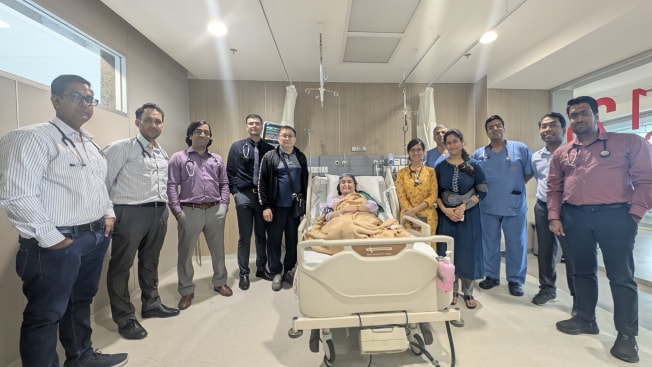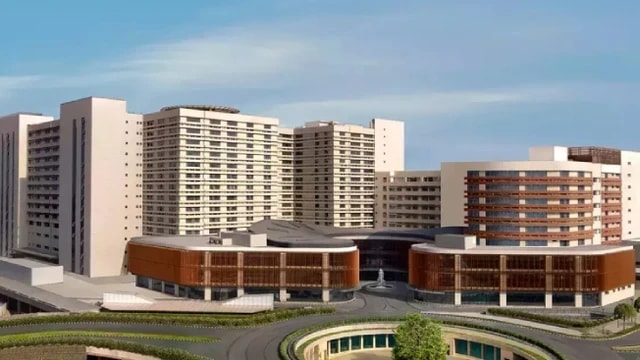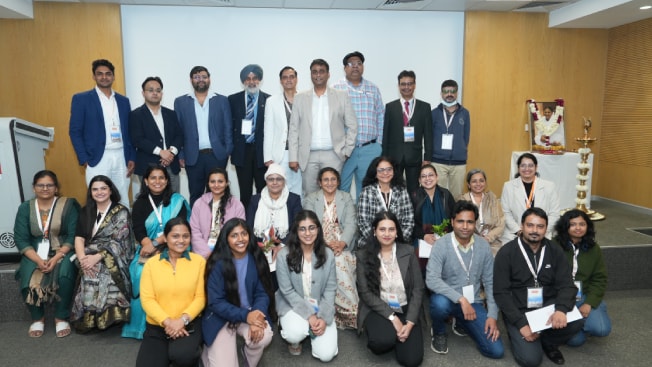
Critically ill and ventilator-dependent, patient was referred from a leading corporate hospital in Delhi to Amrita Hospital, Faridabad, where a minimally invasive bronchoscopic procedure restored her airway and revived her chances for cancer treatment
In a dramatic rescue marked by medical urgency and clinical precision, a 42-year-old woman from Kazakhstan was brought back from near-respiratory collapse by doctors at Amrita Hospital, Faridabad, after a life-threatening recurrence of lung cancer led to a complete blockage of her windpipe.
The patient had recently completed chemotherapy and immunotherapy for lung cancer when she experienced a relapse. Rushed to a prominent corporate hospital in Delhi in critical condition, she was found to have a sizable tumor obstructing the lower part of her trachea. The blockage left her unable to breathe independently, and she was placed on a ventilator. Despite repeated intervention attempts, including discussions among oncologists and surgeons, a viable treatment plan could not be executed due to her dependence on mechanical ventilation.
With conventional surgery considered too high-risk and cancer therapy not possible while ventilated, the patient was referred to Amrita Hospital, Faridabad. The case was taken up by a specialized team comprising Dr. Arjun Khanna (Head of Department – Pulmonology), Dr. Saurabh Pahuja (Head of Interventional Pulmonology), and Dr. Pradeep Bajad (Consultant – Pulmonology).
“The patient’s trachea was nearly occluded by the tumor, and she had been struggling on ventilator support for almost a week. We decided to take a minimally invasive approach using a bronchoscope to remove part of the tumor and insert a stent to open the airway,” said Dr. Saurabh Pahuja, who led the interventional procedure.
The bronchoscopic intervention was carried out under general anaesthesia in a high-end interventional pulmonology OT. The team successfully removed the tumor bulk obstructing the trachea and placed an airway stent to maintain patency.
“The response was almost immediate. By the next day, she was off the ventilator and breathing on her own. On the third day, she was ready to be discharged,” added Dr. Pahuja.
This crucial intervention not only saved the patient’s life but made her eligible once again for systemic treatment, including chemotherapy and immunotherapy, which was not possible in her prior condition. Without bronchoscopic intervention, her chances of recovery were bleak, and prolonged ventilation risked severe complications like infections or organ failure.
“In such cases, every hour counts. Interventional pulmonology can make the difference between life and death, especially for patients who have no surgical or oncological options left in their current state,” said Dr. Pahuja.
The patient has now returned to her home country in a stable condition to resume further cancer management.
“I came to India hoping for treatment, but I ended up on a ventilator, unable to breathe or speak. Today, I am walking, breathing, and going back home—alive. I will always remember what the doctors at Amrita did for me,” said the visibly emotional patient.
Amrita Hospital, Faridabad, has rapidly become a regional referral hub for high-risk airway interventions and advanced respiratory care. Its interventional pulmonology unit is equipped to handle complex cases that conventional methods often fail to resolve.
This case serves as a powerful example of how cutting-edge, minimally invasive medical innovation—when performed with precision and urgency—can restore hope and life for critically ill patients, even in the most dire scenarios.


